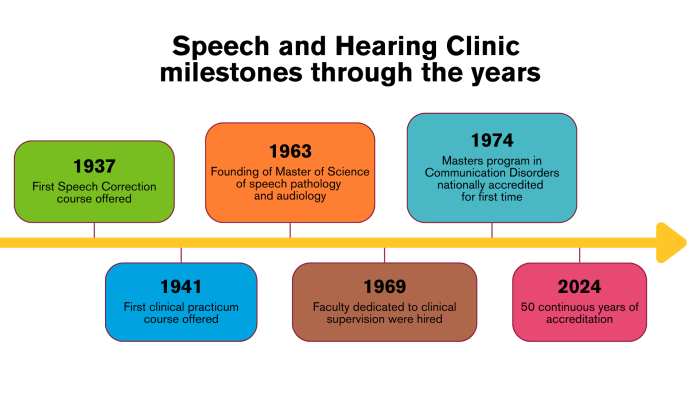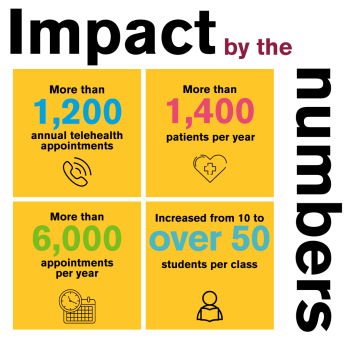80 years of pioneering speech and hearing services for the community

Joshua Breger (right) holds a device used in a procedure called the flexible endoscopic evaluation of swallowing, or FEES, in which a flexible scope with a camera is passed through the nose to reach the back of the throat. This is just one example of the services provided by the the Speech and Hearing Clinic at ASU's College of Health Solutions. Courtesy photo
Over 80 years ago, in 1937, the first course in communication disorders, Speech Correction, was offered at Arizona State University.
As additional courses were added and programs in speech and hearing science were developed, the Speech and Hearing Clinic at ASU was born from the need to provide students with hands-on training. This year, it celebrates 50 years of accreditation.
Although the exact date of the first patient visit was not recorded, said Tracey Schnick, assistant director of clinical services at the Speech and Hearing Clinic, today the clinic continues to support the speech and hearing science programs at the College of Health Solutions and serve the wider community as it has for 50 years.
“As far as history, the clinic is so interwoven with the Speech and Hearing Science programs that many of the victories, successes and milestones are shared by both,” Schnick said.
The clinic's primary mission and purpose is to provide students with a wide range of clinical training experiences to prepare them for their future careers as speech-language pathologists and audiologists.
“Clinical practical training is a key component of the curriculum in our programs,” Schnick said. “The clinic offers students the opportunity to gain valuable clinical skills while under the supervision of our licensed clinical faculty. This practical training is meant to complement learning in the classroom.”
To ensure students have a well-rounded education, the clinic offers a diverse number of evaluations, procedures and interventions typically considered highly specialized and not commonly available in a typical outpatient setting, according to Joshua Breger, director and clinical associate professor at the College of Health Solutions.
“For both speech and audiology, we provide services that are hard to find in the community because we want to expose the students to many different experiences in the field and provide the highest-quality care to those who may otherwise not have access to such services,” Breger said.
ASU Speech and Hearing Clinic locations
Coor Hall on ASU's Tempe campus
975 S. Myrtle Avenue, Tempe, AZ 85281
Hours: Monday–Friday, 8 a.m.–5 p.m.
Phone: 480-965-2373
Community Services Building
200 E. Curry Rd., Tempe, AZ 85281
Hours vary based on session hours.
Phone: 480-965-2373
An example of one such procedure is the flexible endoscopic evaluation of swallowing, or FEES, according to Breger. A thin, flexible scope with a camera is passed through the nose to reach the back of the throat. Clinicians can observe the swallowing process directly and watch for issues.
“The graduate students are conducting the evaluations and treatment sessions under the direction of a speech-language pathologist or audiologist,” Breger said. “This gives them real-world, hands-on experience as they progress through the program. It is a wonderful experience to watch them become their own clinicians.”
The relationship between the College of Health Solutions speech and hearing programs and the Speech and Hearing Clinic has proven beneficial. The College of Health Solutions has assisted with the development of community partnerships, infrastructure and administrative support, and community outreach.
“The College of Health Solutions has partnered with the ASU Speech and Hearing Clinic to put on summer camps for students who are underrepresented in speech-language pathology and audiology and health care in general,” Breger said. “This helps us target one of our core goals, which is to increase representation in our field.”
Partnerships within the community are a cornerstone of the clinic. The ASU Speech and Hearing Clinic has been in partnership with the Arizona Commission for the Deaf and Hard of Hearing since 2021. Through this partnership, the Hearing Healthcare Assistance Project provides free hearing testing, hearing aids, hearing aid fitting, batteries, follow-up care and communication training for adult Arizona residents with limited income who qualify. To expand the availability of hearing health services to those in need across the state, partnerships with the University of Arizona and Northern Arizona University were added to the project.
Another partnership is with the Virginia G. Piper Medical Clinic at St. Vincent de Paul. Through this partnership, clinical faculty and graduate students from speech and hearing provide free services to vulnerable populations. This not only fills a much-needed gap in the health care system, it instills a strong sense of advocacy into future speech and hearing professionals.
“To be really embedded in the community and being able to do that for over 50 years is why this is such a big deal,” Berger said. “To be here serving the students, serving the community for that length of time and just continuing to grow in the scope of what we do.”
In these 50 years, the clinic has seen significant increases in the use of their services and overall interest in speech and hearing degree programs. As the field continues to expand, so do the services of the clinic.
“The future for the ASU Speech and Hearing Clinic looks bright, with plans to continue to grow speech and audiology services in specialty areas based on the needs of the community while continuing to provide high-quality, evidence-based training to students enrolled in speech and hearing science programs,” Schnick said.
For more information about the ASU Speech and Hearing Clinic, including how you can get involved, visit ASUSpeechandHearingClinic.org.
More Health and medicine

What makes human culture unique?
Why is human culture — the shared body of knowledge passed down across generations — so much more powerful than animal cultures?“What’s special about our species?” is a question scientists have…

ASU honors students work on HPV research as part of Barrett College's largest-ever group thesis
Not every undergraduate student comes across the opportunity to do research as part of a team. Even fewer have had the chance to join a team of 86 students doing multidisciplinary research with real-…

College of Health Solutions alumnus named Military Medic of the Year
By Keri Hensley and Kimberly LinnJonathan Lu has looked out for the health of his fellow military service members his whole career, starting with his role as a combat medic in the U.S. Army.Driven by…

